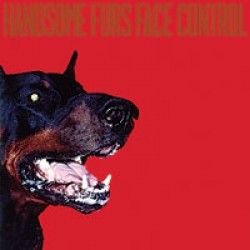Handsome Furs
Face Control
(Sub Pop)
In Wolf Parade, Dan Boeckner makes blurry indie-rock that twists and turns in so many directions, it's often difficult to grasp. In Handsome Furs, which he co-fronts with his wife Alexei Perry, he makes music that's slightly more accessible - synth-guided tunes that still sway to the artsy side of the spectrum. On the Furs' second album, Boeckner and Perry sing about the end of the world and self-doubt amid spare beats and handclaps punctuated by piercing guitar stabs. It's all very splintered and cryptic, with Boeckner's cracked, straining voice laid on top of bedroom electronics that either get stuck on repeat or fall apart altogether by song's end. Face Control's best cuts - the coolly robotic "Legal Tender," "Talking Hotel Arbat Blues'" 21st-century rockabilly - don't sound like they're from a specific place or time. Which is Boeckner and Perry's point: With the apocalypse right around the corner, who has time for nostalgia? - Michael Gallucci
Julie Doiron
I Can Wonder What You Did With Your Day
(Jagjaguwar)
Following her stint as bassist for Canadian psychedelics Eric's Trip, Julie Doiron embarked on a decade-plus solo career. Her records are marked by a stark confessional quality and a mostly downcast acoustic vibe. Even Doiron's ode to motherhood was titled Loneliest in the Morning, for crying out loud. On 2007's divorce album Woke Myself Up, she got her rock feet wet again, recording with the former members of Eric's Trip. Hitting a prolific stride with last year's Mount Eerie collaboration Lost Wisdom, Doiron follows up quickly with I Can Wonder What You Did With Your Day. What sets this latest outing apart from Doiron's previous work isn't the lack of self-confession, since there's plenty of that to be found on the bouncy "Tailor" or the fuzzed-out "Consolation Prize." Rather, the difference here is in Doiron's very noticeable and refreshing happiness, as "Nice to Come Home" and "Glad to Be Alive" evince a newfound cheerfulness that once seemed impossible for the author of the somber Goodnight Nobody. Also, production by Eric's Trip leader Rick White keeps Wonder pushing further toward rock, with the awesome "Spill Yer Lungs" being Doirin's crunchiest number in many moons. Expect the unexpected throughout Wonder, as Doiron flashes a skill set that would have been hard to predict. Welcome back, Julie. Evidently, we hardly knew you after all. - Chris Drabick
White Lies
To Lose My Life
(Fiction/Geffen)
The latest band to get a whole bunch of English people's knickers twisted just reached the legal drinking age in the U.S. That means White Lies were born at least five years after most of the groups they sound like started to fizzle out. Moody, gloomy and full of big anthemic guitars, the songs on To Lose My Life range from bizarre (the ghostly lovers' spat of "Unfinished Business") to WTF ("E.S.T." is all about electroshock therapy). But it's the trio's somber synths and singer Harry McVeigh's mournful baritone that drive home the band's gothtastic point: Death really becomes them. "Blood," "dead" and variations on these words show up every five minutes or so. Still, it's not all doom 'n' gloom - despite its to-the-point title, "Death" is actually kinda jolly. And you can almost hear a smile breaking out during the chorus of "A Place to Hide." Misery occasionally likes a little cheery company. - Gallucci
Cursive
Mama, I'm Swollen
(Saddle Creek)
Years before lonely-heart emo kids began making bedroom confessions about their broken-down love lives, Tim Kasher was there. The Cursive frontman has been releasing records for a dozen years now, chronicling the up-and-down affairs of his heart. He's expanded his stories and sonic palette over the years (2006's Happy Hollow was seeped in conceptual narrative), but he's never sounded as grown up as he does on Mama, I'm Swollen, the band's sixth album. Kasher is still introspective to a fault ("I Couldn't Love You"), but he's also exploring subjects somewhat alien to him ("Caveman" shakes his family tree and a Neanderthal falls out). Meanwhile, the rest of the guys in Cursive pile on riffs, instruments and blasts of noise that underline the gravity of Kasher's words. He still doesn't have any answers about what makes men and women tick, but now that he's in his 30s, he has a better understanding of the thin line that divides them. - Gallucci
Casiotone for the Painfully Alone
Advance Base Battery Life
(Tomlab)
Recording and releasing records isn't cheap, especially in a recession; the cheapest records are ones that have already been recorded. Advance Base Battery Life collects split singles, EPs and limited edition ephemera Casiotone made for smaller labels over the years. "Lesley Gore on the T.A.M.I. Show" contains an instantly catchy keyboard riff and Jenny Herbinson's lovely guest vocals. "Sunday St." pulses and thumps with club-level synthesized bass fuzz. "Hot Boyz" sounds like something Lily Allen would cook up, if forced to record on an indie budget. "White Corolla" is an excellent example of the twee electro-pop that Casio's Owen Ashworth does so well. The pair of Bruce Springsteen covers he cut with Concern adds something to the originals. The vocoder on "Born in the U.S.A." fills the Boss' anthem with robot, instead of working-class, angst. "Streets of Philadelphia" retains some of Springsteen's ghostly atmosphere, but adds a beatbox that sounds ripped from Philly's streets. The only problem with this package is that, at less than 40 minutes, it doesn't stretch your dollar as far as it could've gone if other cuts had been included. But it's still easier on your wallet than seeking out limited-edition vinyl. - Jeremy Willets
Bonnie "Prince" Billy
Beware
(Drag City)
Like a creature from some Appalachian folk tale, Will Oldham continues to creep out of the woods nearly every year with a new album of eerie, autumnal country-rock. He hasn't lost a step since 2008's Lie Down in the Light - or, for that matter, over the past 20 years that he's been penning poignant folk songs (more than 15 albums' worth) under pseudonyms like Palace Music, Palace Brothers and now Bonnie "Prince" Billy. Beware continues where 2006's The Letting Go started anew, with large instrumentation, big backing harmonies and epic- sounding songs - a contrast to his earlier skeletal, low-fi, gothic country records. Beware is big and beautiful, but it's also slow as hell. Oldham sings and actually looks like some ancient tortoise (his grizzled, bald head adorns the album's cover). Plus, it sounds just like every other Oldham album (a set of 13 snail-paced American roots ballads). But it's mesmeric and haunting material, with upbeat tunes like "Beware Your Only Friend" melding seamlessly with somber anthems like "Death Final," making it perfect for rainy-day ruminations or a lazy sunny afternoon. - Keith Gribbins
Kylesa
Static Tensions
(Prosthetic)
Occasionally, the fourth time's a charm. Savannah's Kylesa have been slogging it out in trenches since the beginning of the decade and have finally released an album that trounces their memorable live show. Static Tensions improves on the band's formula of detuned hardcore punk and metal played through vintage amps. The niche genre is called sludge because, well, it sounds sludgy. Drummers Eric Hernandez and Carl McGinley provide a sound that is massive and tribal. Fans of High on Fire and Mastodon will enjoy the progressive guitar work on "Running Red" and "Only One," while more psychedelically inclined individuals can soak in the stellar ballad "Unknown Awareness." While each song has memorable riffs, the hypnotic vocals of guitarist Laura Pleasants and aching shouts by guitarist Phillip Cope provide a more tangible entrance point into the fray. The songwriting is tighter than on previous albums - even when Kylesa veers off into left field it's only a detour, not wanderlust indulgence. The frenzied drumming on "Said and Done," the majestic glory of "Nature's Predators" and Meddle-era Pink Floyd grooves of "To Walk Alone" are among the album's peaks. While it doesn't have much crossover potential, Static Tensions synthesizes a wealth of styles and influences into a truly rewarding album. - Nick DeMarino
Bishop Allen
Grrr…
(Dead Oceans)
If Justin Rice and Christian Rudder of Bishop Allen had a big empty room and unlimited funds, they might fill it with things like dark-colored horses, chocolates, marigolds and a collection of shells. At least that's the impression you get from this lyrically charming third album, which includes all these subjects. The phrasing and imagery gives the album an accessible, bubbly feel, and the sugary pop production is top-notch. With ingredients like a sweet ukulele, shimmering maracas, the gentle quake of bass and a chiming marimba, each song sparkles like a fresh piece of apple pie.
"The Lion & the Teacup" has a colorful effervescence that sounds like the Spinto Band and a thoughtful chord progression that recalls John Vanderslice. Darbie Nowatka's chipper backing vocals on "Oklahoma" are almost as irresistibly adorable as the horse-gallop introduction on "Shanghaied" (which sounds deceptively close to "cherry pie"). Rice and Rudder had cameos in the 2008 film Nick and Norah's Infinite Playlist as a hip, on-the-rise band. Their roles weren't far off the mark. Soon enough, they could be filling many rooms with their favorite things. - Danielle Sills Melinda Doolittle Coming Back to You (Hi Fi)Ê She may have been one of American Idol's most gifted vocalists, but the irony is that if the 2007 third-place finalist had actually won, she would have been under record-label pressure and may never made a CD this suited to her talents. Producer Michael Mangini (Run-DMC, Joss Stone) surrounds her savvy vocals and old-school soul smarts with live instrumentation and upbeat horn charts, giving the album a vital human warmth. It's a good thing, because Doolittle is the kind of performer who practically inhabits her material. She wrings every drop of passionate, romantic feeling out of the Sammy Cahn standard "The Best of Everything" and caresses every word of the gorgeously lush 1955 Doris Day tune "I'll Never Stop Loving You." Best of all, she does this while steering clear of tiresome vocal runs - the surest way to kill a melody. As these songs reveal, Doolittle is a musical chameleon comfortable mining a range of styles, whether she's singing with gusto that Tina Turner would envy on the driving "Declaration Of Love" (empowered by some mighty horn blasts) or showing off her grittier blues edge on a pair of Robert Johnson numbers ("Dust My Broom" and "Walkin' Blues"). Coming Back to You is an honest portrait of Doolittle as an artist. - Tierney SmithÊ














